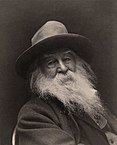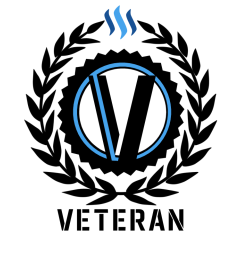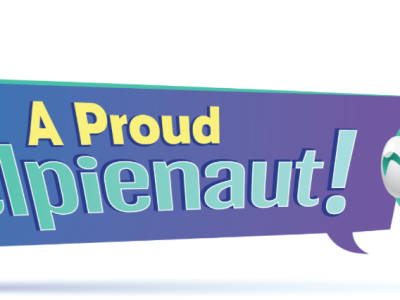I don't remember exactly when I got the inspiration to write this poem. More significant is its meaning and inclusion in the American pantheon of poetry. It rides on the coat tails of two earlier poems written by greater poets than I.

Public Domain image from Wikipedia
Inside Leaves of Grass is Whitman's poem "I Hear America Singing." It's a short poem relative to some of his others, but it's also a poem of great praise for the American spirit. Whitman makes it perfectly clear whose honor his head is nodding toward with these opening lines:
I hear America singing, the varied carols I hear,
Those of mechanics, each one singing his as it should be blithe and strong,
The carpenter singing his as he measures his plank or beam,
The mason singing his as he makes ready for work, or leaves off work,
Whitman considered himself a common man's poet, and his attempt with Leaves of Grass was to write in such a way that he revealed and praised the American spirit of democracy, of freedom, and equality. Those were his values, and he believed they were the values of America. And he wrote in a style and form that would elevate those values. "I Hear America Singing" is a great example of that style and form.

Public Domain image from Wikipedia
Influenced by Whitman, Hughes insisted that he and his fellow black Americans be included in Whitman's America with the poem, "I, Too." The following lines from that poem encapsulate Hughes' vision of freedom and equality with succinct language that bears imitation:
I, too, sing America.
I am the darker brother.
They send me to eat in the kitchen
When company comes,
But I laugh,
And eat well,
And grow strong.
It is in this same spirit and tradition that I wrote "We All Sing America Now." Some time after returning home from Iraq, 2006 or 2007, I sat down and penned these verses giving full credit to Whitman and Hughes for the inspiration through allusion and similarity in style and form. The poem is included in my poetry collection titled Rumsfeld's Sandbox. I hope you like it.

We All Sing America Now
I sing America, too.
I sing America the beautiful, America the ugly,
washed in the blood, cast in the pit,
on loan and drawing interest.
I sing America broad and bold,
cold and hot, rich and poor, dirty and clean.
I sing America on the silver screen.
I sing her golden on wings of wax.
I sing America’s spacious skies and equally her specious lies.
I sing her mountains majestic, purpled and passioned
with rock and snow; and her waves of ambered grain.
I sing America on Elm and on Main.
I sing America lullabies!
I sing America’s blues, her smooth cool jazz,
the rockabilly swing of garage bands doing cover tunes,
bubble gum pop and country-western ballads,
soundtracks, remixes, John Cage and his chance variations.
I sing America loud, piano man.
I sing America corporate. Her white collar crimes
and petty thieves tossing crumbs at stool pigeons.
Overfilled jail cells, missing children and battered wives,
homeless men and the men who once employed them, just
and unjust wars, illegal aliens and the landlords who house them.
I sing America’s colors.
I sing of her blue and gray, her black and white,
and all the colors of the rainbow. The colors
of Whitman in his hospital room
kissing the soldiers calling out Mama’s name
and Langston with his brothers pushing brooms.
I sing all the colors just the same.
Ye poor, ye tired, ye huddled masses,
ye Shinseki’d, ye whistle blowers,
ye union workers on the docks,
school teachers, ministers, truck drivers,
farmers, all ye who toil and labor for a day,
even you self employed filing your 1099s,
put down your awl, your pike, your oil of production,
put down your picket sign, your peace sign, your sign of second comings,
put down your axe, America,
pick up your flag and sing.

Review Me, Please

If you like "We All Sing America Now," check out more of my poetry:
- Cigar
- Music
- The Ballad of the Crustacean King
- Nocturne: Battlefield Sonnet
- Tattoo
- 20 Acres
- The Journeymaker's First and Last Hope
- Old Goth
And the backside 5 (my latest five posts):
- Review Me, Please
- Weird Fiction: Shopping for Feelings
- Even Crypto Relationships Require a Lot of Freaking Work
- The Saddest Tale Ever Told
- Feral Spirit: Steem Monsters Character Card Backstory Entry

Join us @steemitbloggers
Animation By @zord189
 ">
">created and used by veterans
with permission from @guiltyparties


